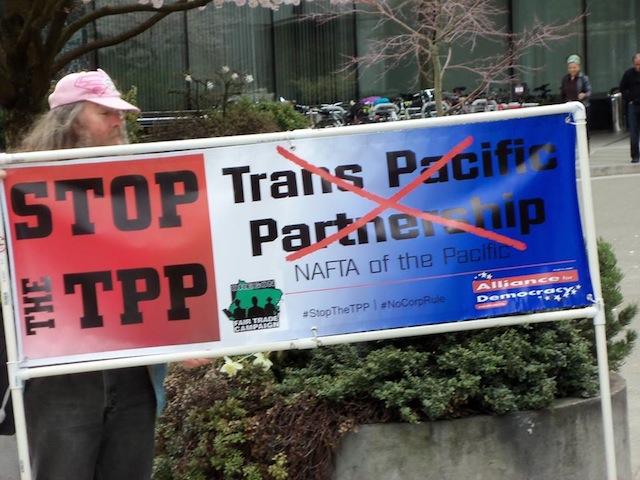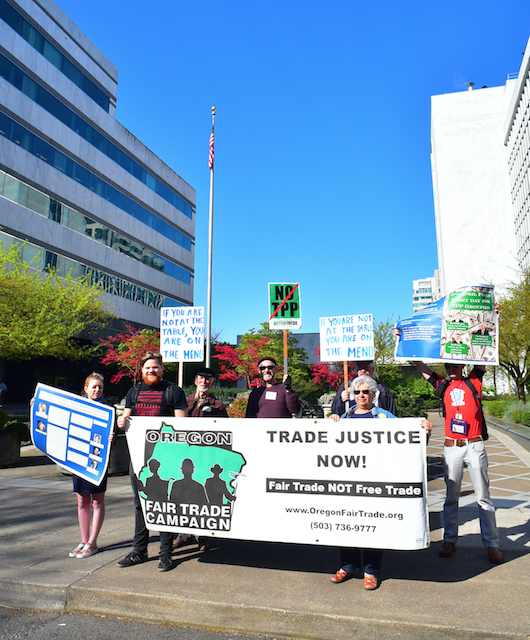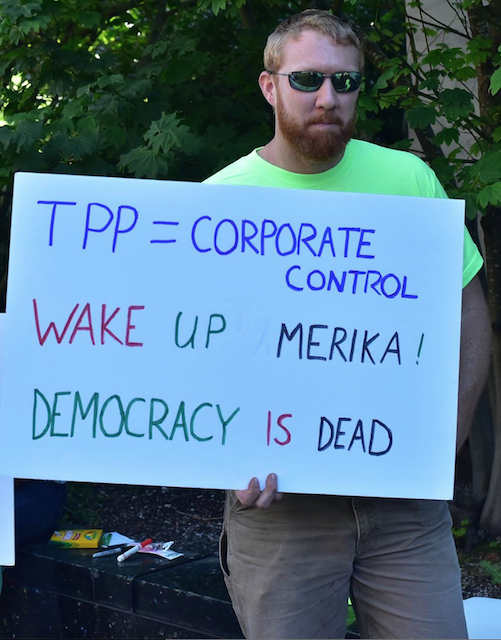
Photo by David E. Delk
Story by Pete Shaw
Fair trade advocates gathered outside of Oregon Senator Ron Wyden’s Lloyd Center office on April 1, demanding he not be fooled by the empty promises of the Trans-Pacific Partnership (TPP). The event was part of a statewide action that saw opponents of the TPP converge on the congressional offices of Representatives Earl Blumenauer, Susan Bonamici, and Kurt Schrader, as well as Wyden’s Medford and Salem offices.
The proposed 12-nation trade arrangement would be the largest of its kind, encompassing countries that produce over 40% of the world’s gross domestic product, and if enacted would be likely to negatively impact jobs, wages, access to medicines, and the environment.
“The time for exposing the foolishness in passing more job-killing trade deals is now,” said Michael Shannon, Executive Director of the Oregon Fair Trade Campaign. “The legacy of past deals has been increased deficits, lost jobs, and depressed wages. Congress should not get fooled again by repeating the same mistakes, hoping for a different result.”
After 7 years of negotiations, the TPP was signed on February 4 by the 12 Pacific Rim countries involved in the agreement. It now must be ratified by the governments of those countries, and President Obama has made clear he intends the TPP to be one of the grand accomplishments of his administration.
Sadly, what President Obama–and certainly the multinational corporations and their lobbyists who have been pushing the TPP–would regard as a great victory may prove to be devastating to working people. After all, the track record of so-called free trade agreements (FTA) have shown that in practice they have very little to do with free trade, but rather are all about increasing corporate profits. According to Public Citizen’s Lori Wallach, the North American Free Trade Agreement (NAFTA) has resulted in a net loss of over 1 million US jobs, decreased wages and rising inequality. The Economic Policy Institute reports that between 1997-2014 the US lost over 5 million manufacturing jobs, with most of those job losses due to “growing trade deficits with countries that have negotiated trade and investment deals with the United States.”
Those lost jobs and wages, as well as the dismantling of environmental regulations, have helped pad corporate bottom lines. The same can predictably be expected from the TPP for, as Shannon said at Friday’s rally, “If we’re going to enter into an agreement with countries with a low or no minimum wage, it will give US companies an incentive to offshore more jobs.”

Photo by Pete Shaw
The TPP would also result in further deterioration of the environment. While the Office of the US Trade Representative has stated the TPP’s “groundbreaking provision will help the environment” and that its text “includes the most comprehensive environmental commitments we have ever negotiated in a trade agreement and represents a significant opportunity to address pressing environmental challenges,” the Sierra Club has a different take. The group’s “analysis of the final text reveals that the environment chapter would fail to protect the environment and in some respects falls short of past US trade agreements…and of what is needed to actually reduce environmental degradation on the ground. Far from an environmentally-friendly agreement, the TPP text also fails to protect environmental policies from the threats posed by the deal’s many polluter-friendly rules, including those related to foreign investment and fossil fuel exports. For the environment, the TPP’s net balance is decidedly negative.”
Another deeply troubling aspect of the TPP concerns its effect on access to medicines, including life saving ones. After the final text of the TPP was released, Doctors Without Borders issued a statement saying it was “gravely concerned about the effects that the Trans-Pacific Partnership trade deal will have on access to affordable medicines for millions of people, if it is enacted.” Noting that the TPP would “further delay price-lowering generic competition by extending and strengthening monopoly market protections for pharmaceutical companies,” Doctors Without Borders concluded, “The TPP is a bad deal for medicine: it’s bad for humanitarian medical treatment providers such as MSF (Doctors Without Borders), and it’s bad for people who need access to affordable medicines around the world including in the United States.”
Considering these realities, it should come as no surprise that the TPP was negotiated in secret. Crafted largely by corporate representatives, few members of governments (including the US Congress) knew what it contained until it was ratified in February. Once President Obama asks Congress to take up the TPP, debate will be limited to 90 days during which no amendments can be added to the accord–senators and representatives vote either yes or no. Combined with Fast Track–the legislation approved by Congress that gave away its constitutional mandate to oversee trade–the whole history of the TPP has been an exercise in usurping democracy.
Prior to its ratification, all that was known about the TPP was due to material leaked through Wikileaks. As David Delk of the Alliance for Democracy has noted, the TPP is about “government of, by, and for the corporations.” Delk’s point becomes even more acute when considering how the TPP, as with previously ratified FTAs, allows corporations to sue governments for loss of future profits should a government pass legislation that would curtail those profits. For example, last year the Portland City Council passed a resolution that says the city will no longer build fossil fuel infrastructure. But if the TPP is passed by Congress and signed by President Obama, any corporation could sue Portland–in a private court–for the money it will lose by not being able to build that infrastructure.
Those lawsuits have proved successful for corporations in the past, with over 90% of those brought against the US before the World Trade Organization–a body whose members are not elected by any country’s citizens–decided in favor of corporations. If such a suit was brought against Portland, the City’s only choice to avoid paying out a large chunk of money would be to repeal the resolution. Similarly, should Oregon refuse to allow Nestle to mine water in the Columbia River Gorge, Nestle could sue Oregon for future lost profits. Food safety standards, environmental and labor safety regulations, legislation promoting solutions to climate change, GMO labeling–all could be declared an impediment to corporate profits, despite the clear benefits these rules bring people.
As a result of these profit-over-people transgressions, in January over 1,500 progressive organizations, including over 75 from Oregon, representing women’s, LGBT, environmental, consumer, family farm, labor, faith, student, internet freedom, human rights and other constituencies sent a joint letter to Congress warning that “the TPP elevates investor rights over human rights and democracy.”

Photo by Pete Shaw
Despite these and numerous other issues with the accord, Senator Wyden and Representatives Blumenauer, Bonamici, and Schrader–all Democrats–have refused to condemn the TPP. Early on during TPP negotiations, Wyden decried a lack of transparency, but his protests seemed more geared toward feeling a personal slight rather than the anti-democratic nature of the secrecy. He has never found a problem with the actual rules–nor apparently the repercussions–of any FTA.
At Friday’s rally, Shannon, along with activist Ben Gerritz and nurse practitioner Betsy Zucker presented large cards to Wyden field representative Ree Armitage and Blumenauer staff member Jason Little to remind them of the corporate powers that support the TPP.
“If the TPP is ratified,” Gerritz told Armitage and Little, “millions across the globe will struggle with new barriers to affordable medication, especially biologics, a class of drugs with great promise for treating diseases like cancer and hepatitis. It comes down to who is lobbying for the TPP and who–such as Doctors Without Borders–is asking our members of Congress to respond to the will of the people.”
“I know Oregon is dependent on trade,” Gerritz continued. “I know free trade deals have hurt working people. I also know the 1% don’t need more money.”
Shannon noted how despite the rhetoric coming from supporters of the TPP, it does little to deal with major issues facing people worldwide. “I don’t believe a 21st century trade agreement would omit the phrases ‘human rights’ and ‘climate change,’” he told Armitage and Little. “I don’t believe we need to be giving greater access to our markets to human rights abusers like Malaysia and Brunei.”
Gerritz also noted that New York’s entire federal delegation–both Democrat and Republican–had signed a letter in opposition to the TPP. “Why is it that Oregon, which is heavily Democratic,” he asked Armitage and Little, “can’t represent its constituents like New York’s delegation?” he asked.
Though the staffers did not seem especially engaged by the protesters, Armitage did perk up when Gerritz expressed worry about Democrats staying home come November should their representatives support the TPP. Though Wyden, the ranking member of the Senate Finance Committee, is in little danger of losing his seat, the Democratic party may be squandering a tremendous opportunity should congressional representatives like Wyden, Blumenauer, Bonamici, and Schrader support the TPP.
If these politicians refuse to stand up for the working people who make up their base—never mind for keeping the planet sustainable for human life–they should not be surprised if voters lack enthusiasm come November.
Want to get involved? Check out the Oregon Fair Trade Campaign at: http://www.citizenstrade.org/ctc/oregon/






